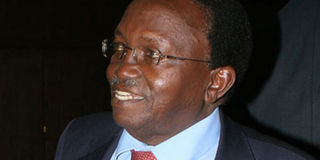Mwiraria on the spot over massacre

Former Finance minister David Mwiraria is among former high ranking government officials questioned by the Ethics and Anti-Corruption Commission on Monday in connection with the Anglo Leasing scandal. FILE PHOTO | JENNIFER MUIRURI | NATION MEDIA GROUP
Two witnesses were on Tuesday taken to task by the truth commission over their contradicting and inconsistent testimonies on the 1984 Wagalla massacre.
Former Finance minister David Mwiraria maintained that a visit by the Kenya Intelligence Committee to Wajir a day before the killings was purely to assess development projects.
But on closer scrutiny, he admitted that the trip was sanctioned to resolve the Shifta movement in north eastern Province.
Mr Mwiraria, who was then Home Affairs permanent secretary, told the commission that he earlier denied being in the delegation that went to Wajir on the fateful day for fear of victimisation.
Brigadier (Rtd) Philip Chebet angered the commissioners when he first denied that there was no Army troops’ movement on the day the killings took place but later admitted releasing Army vehicles to reinforce the operation at Wagalla airstrip.
Brigadier Chebet said that after the Wagalla operations, the security team was called to a meeting for an update and cautioned on issues relating to proper planning of an operation to avoid an abrupt situation.
Mr Mwiraria blamed the regime of former President Moi for making it difficult for people to talk about the Wagalla massacre and find out the truth of what happened.
“In the context in which we were operating, it was risky to speak out your mind. One could be detained or killed for telling what happened,” he said.
He apologised to the victims, saying that it was a tragedy that should have not been allowed to happen. He requested the commission to give him more time to recollect all that happened during their trip to Wajir and give the evidence in writing.
Mr Mwiraria said it was possible the action was carried out by the military without the knowledge of the Ministry of Home Affairs, adding that the district security team had the discretion to order the detention of young men, who were rounded up before being detained at the airstrip.
He denied ever attending any meeting to plan and execute the massacre, stating that the only request the ministry received was that the province was an operation area and needed more police reinforcement.
He said he could not remember whether any senior police officers involved in the execution were punished, taken to court or interdicted.
Brigadier Chebet, who was an Army major in charge of a unit stationed at Garissa in 1984, was responsible for providing security to a team of Kenya Intelligence Committee that visited Wajir a day before the massacre.
Asked why he was taken to Wajir to provide security to the team yet there was another Army major in Wajir, he told the commission that the orders were issued by his superiors and his duty was to obey the instructions.
Asked why a normal familiarisation tour attracted a military protection and not the police, he said that because the intelligence committee team came on a military aircraft and landed on a military airstrip, they were tasked with providing their security.




